Matt Rees's Blog - Posts Tagged "hardboiled"
Review: Crime fiction's first PI Pig
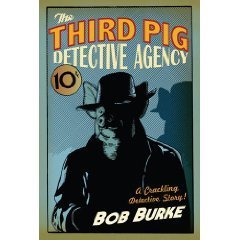
The Third Pig Detective Agency by Bob Burke
published by The Friday Project isbn 1906321752
Seeing his brothers' houses blown down by the Big Bad Wolf ("I'll huff and I'll puff...") taught Harry Pigg to build his own house out of bricks, thus avoiding the grisly fate of the first and second pigs. The nursery rhyme carries a lesson for all little children... It also forms the somewhat traumatic background that turns Harry into the wise-cracking detective of Bob Burke's engagingly witty new novel.
We're in Grimmtown, where everyone is a character from a fairy tale or a nursery rhyme. But it's no fairytale wonderland. In fact, it's rather true to the stories of the Brothers Grimm, whose nightmarish old tales always seem to me distinctly inappropriate for small children (the chipper little Gingerbread Man, for example, gets eaten and that's the end of that. Whoever thought these would be good stories for kids?) On the mean streets of Grimmtown, hard-up Harry Pigg is hired by Aladdin to track down his stolen magic lantern, though this displeases Aladdin's thuggish bodyguard, one of the Billygoats Gruff. Dwarfs, leprechauns and genies ensue.
This is undoubtedly the most whimsical hardboiled detective novel ever written, and it's utterly delightful.
International Noir: Contrast to hardboiled environs gives Omar edge
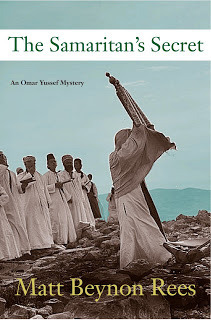
The blog International Noir Fiction describes my series of Omar Yussef Mysteries as creating a "comedie humaine" for the Palestinians. It's a great review of the third of my novels THE SAMARITAN'S SECRET by a reviewer who's obviously read and enjoyed the first two books as well. The review notes many of the aspects of Omar's impulsive, sensitive character which defy the detective genre. I particularly like this: "Rees give us a couple of chase sequences that are nonetheless exciting for Omar Yussef's lack of speed and agility--and are not simply amusing or "cute" as has been the case with some elderly detectives over the years of the genre. INF concludes: "Rees provides insight and also a satisfying crime story."
Published on July 10, 2009 23:07
•
Tags:
blogs, crime, fiction, hardboiled, omar, palestine, palestinians, reviews, samaritan-s, samaritans, secret, yussef
“What happened to the third little pig, Daddy?”: Bob Burke on pig detectives and his Writing Life
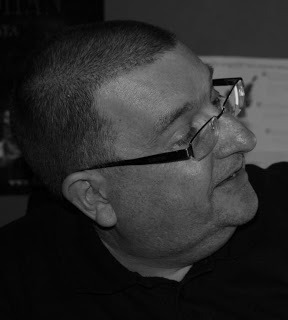
Anyone who’s perused the crime fiction section of their bookstore knows the joy of finding something original among the tired old shelves of loner detectives who play by their own rules on the mean streets of some dingy inner city. The clichés of the genre were uppermost in my mind when I chose to write about Omar Yussef, a schoolteacher and detective in a Palestinian refugee camp on the edge of Bethlehem. Irish writer Bob Burke has not merely blown the crime formula away like Dirty Harry's Magnum – he’s used them as the source of much of the fun in his great new novel “The Third Pig Detective Agency.” Bob’s first book in the series is populated by characters from nursery rhymes and fairy tales. His detective is the surviving Little Pig (after the Big Bad Wolf ate the first two) and his mean streets are in Grimmtown (as in The Brothers Grimm of fairy tale fame). In my review, I wrote that “Third Pig” is “undoubtedly the most whimsical hardboiled detective novel ever written, and it's utterly delightful.” As you’ll see from this interview, so is Bob Burke.
How long did it take you to get published?
Since I started taking writing a bit seriously, about three years – but I was lucky.
Would you recommend any books on writing?
In terms of what I got out of them, I’d suggest two: Stephen King’s On Writing for its very straightforward, no nonsense approach to putting pen on paper (as well as being a very honest autobiography) and Carole Blake’s From Pitch to Publication which shows how the industry works from first draft, through getting an agent, contracts, publication etc. Both are invaluable for anyone starting out.
What’s a typical writing day?
During school term I get my sons to school and am back at the house by 9:30 (probably still asleep). I’m definitely not a morning person so after a refueling session with coffee, I start by checking email, blogs, twitter and doing any publicity bits and pieces that may have arisen (aka arseing around on the web). Once I’ve evolved from zombie to something approaching human I start on whatever story I happen to be working on and work through until about 5pm, with numerous refueling stops along the way (coffee, must have more coffee). I never worry about word counts as long as I have something on paper (or on PC to be more accurate). Eventually something tangible appears from the combination of brain, caffeine and willpower.
Plug your latest book. What’s it about? Why’s it so great?
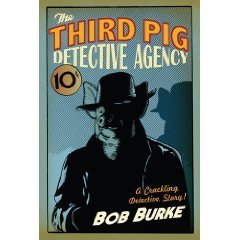
Harry Pigg – sole survivor of the unfortunate Three Little Pigs incident and self-styled master detective – is hired by Aladdin to locate his missing lamp. The trail leads Harry through a maze of unreliable informants, mysterious strangers, not-so-dastardly villains, occasional beatings and an unpleasant encounter in a sewer. Is it great? Most people that have read it seem to like it, which is all I can ask for. It’s certainly a different take on the traditional detective novel.
How much of what you do is:
a) formula dictated by the genre within which you write?
b) formula you developed yourself and stuck with?
c) as close to complete originality as it’s possible to get each time?
The formula for the detective story (particularly the hard-boiled type) is so well established that it provided the perfect template to work with – and take the piss out of. I just wanted to approach it from a slightly skewed angle but still work with all the conventions that people are familiar with (and probably expect). I’d like to think that my take on it has some degree of originality that will make readers want to come back to it again (and again and again and…)
What’s your favorite sentence in all literature, and why?
Squire Trelawney, Dr. Livesey, and the rest of these gentlemen having asked me to write down the whole particulars about Treasure Island, from the beginning to the end, keeping nothing back but the bearings of the island, and that only because there is still treasure not yet lifted, I take up my pen in the year of grace 17__ and go back to the time when my father kept the Admiral Benbow inn and the brown old seaman with the sabre cut first took up his lodging under our roof.
It’s not great literature but that one line, the opening to “Treasure Island,” opened up the world of story to me. With that book I went from reading stories that were short and illustrated to a more intimidating volume that was rich with text and had no pictures. Almost immediately I was sucked into the story, all sense of intimidation gone as the narrative carried me into a true adventure story. Even now, Treasure Island remains one of my favourite reads.
The line that made me laugh the most (and still does) is from The Colour of Magic by Terry Pratchett: Rincewind had been generally reckoned by his tutors to be a natural wizard in the same way that fish are natural mountaineers.
What’s the best descriptive image in all literature?
If I might be permitted to go all literary and pretentious, the passage that sends shivers down my spine is the last page or so of Finnegans Wake by James Joyce where he describes the River Liffey flowing into the sea. Yes, most of the rest of the book is impenetrable and I don’t claim to have made any sense of it but that one piece is accessible, evocative and so beautifully written
Who’s the greatest stylist currently writing?
John Connolly. His ability to mix wonderful prose, engaging characters and compelling storylines make me want to weep every time I read one of his books. He’s also managed the difficult task of injecting his otherwise dark stories with a vein of black humor that never seems forced or inappropriate.
Who’s the greatest plotter currently writing?
Jeffrey Deaver. Take an impossible situation, throw in a series of plot twists and end with a satisfying and logical conclusion and you have a recipe for one of his books.
How much research is involved in each of your books?
A quick shufti through the Bookmarks section of my web browser shows one link: an online version of Grimm’s Fairy Tales. Make of that what you will! In fairness, there’s such a rich treasury of nursery rhymes and fairy tales that I can “gleefully molest” (as one reviewer put it) that research isn’t as necessary as it might be for anything else I may write.
Where’d you get the idea for your main character?
I’d finished telling The Three Pigs to one of my sons and he asked, with typical child curiosity, “what happened to the third pig after the story was over?” I didn’t even have to think about it, the image of that third pig becoming a detective sprang almost fully-formed into my head. All I had to do then was work with it and develop a story.
Do you have a pain from childhood that compels you to write? If not, what does?
I think that discovering the power of storytelling through early exposure to Treasure Island and subsequently with Edgar Rice Burroughs and Tolkien fuelled my imagination and gave me the urge to tell stories. Unfortunately there’s no hint of any trauma in the orphanage, wicked stepmothers or being sent out to steal by a shifty guardian in my childhood.
What’s the best idea for marketing a book you can do yourself?
Flog the web to death. Blog about it, twitter about it, link to blogs with similar themes. Also, local papers are always interested in the “local lad does good” angle and will more than likely welcome an approach, which may lead to other media taking an interest.
What’s your experience with being translated?
I’ll let you know if it ever happens!
Do you live entirely off your writing?
Not yet. I do some part time IT training in tandem with my writing but hopefully one day…
How many books did you write before you were published?
One. Again, I know how lucky I’ve been.
What’s the strangest thing that happened to you on a book tour?
A book tour, now there’s an aspirational goal.
What’s your weirdest idea for a book you’ll never get to publish?
Well, if having a pig detective trying to find Aladdin’s lamp isn’t weird enough, I don’t know what is. Seriously, I think that any idea, regardless of how outlandish, may have the germ of a story in it somewhere. It may just need some nurturing and the occasional reality check before it ever becomes part of a coherent narrative.
NPR on crime fiction
Wisconsin Public Radio airs a full hour discussing contemporary crime fiction. It's mainly an interview with the best crime fiction blogger, Peter Rozovsky, whose Detectives Beyond Borders is a fabulous read, full of information and sound opinions. The radio show focuses on "noir" -- which Peter defines more convincingly than anyone I've heard before as fiction in which the hero knows that he's doomed and heads right for it with a strange kind of acceptance. The discussion touches on the films of Truffaut and the books of Izzo, Khadra, Rankin and...well, me.
Published on August 06, 2009 07:05
•
Tags:
blogs, crime, fiction, film, hardboiled
Ellroy Queen: Megan Abbott’s Writing Life

Megan Abbott is the female James Ellroy. When I read her Edgar-award-winning “Queenpin,” I immediately was put in mind of everyone’s favorite noirmeister. Dig it. Even more I loved “The Song is You,” in which Abbott took a real-life missing persons case from 1949 and plumbed her Hollywood characters for real debauchery and dirt like Ellroy at his best. Dr. Abbott (she has a Ph.D. in English and American Literature from New York University) has a great new one that’s a US Independent Booksellers pick for August. As for how she does it, read on, checking out her particularly intriguing writing exercise. As someone might write: Off the record, on the Q.T., and very hush, hush.
How long did it take you to get published?
I wrote for years without finishing anything or knowing what to do with it. Once I finished a novel, it took about a year or so to get an agent and sell it. I was both stupid and lucky. Stupid because I had no idea how hard it would be, and lucky because I found an agent and an editor willing to take a chance.
Would you recommend any books on writing?
I’m sure there are good ones, but, for me, reading novels all the time is much more helpful. I once had a teacher who had us do this exercise I always remember because I use it to this day. He had us pick a favorite passage by an author and rewrite the passage by replacing every word. A noun for a noun, a verb for a verb, and so forth. I took a passage from F. Scott Fitzgerald. It was staggering how much it forced my writing out of an old rhythm and into a new one. I did it a lot with Raymond Chandler novels once I discovered them. It breaks you out of ruts and you pick up this range of cadences
What’s a typical writing day?
I start about eight in the morning and then waste many, many hours—much time lost on thesaurus.com, on following endless research trails—I collect a lot of things: old menus from the 1920s, photos of friars’ roasts from the turn of the century, abandoned diaries. I get lost in them and it can, easily, take me four hours to produce a page, and when I do, it’s usually in a mad rush inspired by guilt for all that procrastinating.
Plug your latest book. What’s it about? Why’s it so great?
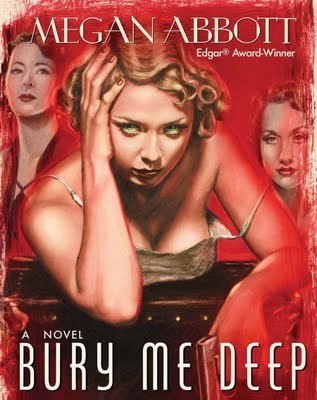
It’s a strange little tabloid tale loosely based on a famous real-life crime from the 1930s—the Winnie Ruth Judd “Trunk Murderess” case. It’s called Bury Me Deep and it follows Marion Seeley, a young woman left by her husband in Phoenix at the height of the Great Depression. Very naïve, very lonely, she falls in with two of the town’s single gals, gals with reputations: Soon enough, she’s swept up in their freewheeling lifestyle, the “thrill parties” they throw. At one of these parties, she meets and falls hard for charming Joe Lanigan, a rising town leader who proves her downfall.
How much of what you do is:
a) formula dictated by the genre within which you write?
b) formula you developed yourself and stuck with?
c) as close to complete originality as it’s possible to get each time?
I am a genre lover—so much so that I like to knock them together. For Bury Me Deep, for instance, the idea was to merge a very traditional melodrama—a woman who faces this almost Edith-Wharton-style dilemma (follow society’s rules or one’s own heart) with a down-and-dirty pulp story of drugs, sin and murder. I think it’s probably true in all my novels—with the possible exception of Queenpin, which I tried to make as close as possible to classic pulp fiction. I think all genres are in many ways one genre, with different accessories. In the end, we’re all fighting social rules, society itself, or all fighting ourselves—which is kind of the same thing.
What’s your favorite sentence in all literature, and why?
Did you ever have a sister, from Faulker’s The Sound and the Fury. In a book swollen with words, twisting and curling on themselves, pounding and thundering—it can still be gathered into in that simple line. And, when that line comes—which it does, more than once—it’s a heartbreaker.
What’s the best descriptive image in all literature?
Humbert Humbert describing Lolita’s feet, or Raymond Chandler describing almost anything.
Who’s the greatest stylist currently writing?
Daniel Woodrell.
Who’s the greatest plotter currently writing?
I guess I don’t really read for plot. In fact, many of my favorite books have rambling, meandering plots.
How much research is involved in each of your books?
For the historical ones—set in the 1930s-60s—a lot, but not in any coordinated way. For Bury Me Deep, I read a lot about TB hospitals and morphine addiction. Then, after a few months, I stop researching and start writing—it’s hardest for me to both at the same time.
Where’d you get the idea for your main character?
She’s modeled on her real-life counterpart, Winnie Ruth Judd, but Marion ends up veering pretty wildly. There was only so much I could find out about what went on in Winnie Ruth’s head, so I ended up making up the rest and soon enough Marion was all her own.
Do you have a pain from childhood that compels you to write? If not, what does?
Only boredom. I had a wonderful childhood with great, creative parents and brother, but it was old-school suburbia and I wasn’t imaginative enough to find the magic in it. I felt like I was just killing time.
What’s the best idea for marketing a book you can do yourself?
Golly, I have no idea. You tell me.
What’s your experience with being translated?
It’s fun to see the editions and see if/how they package it differently. I have no idea if those pages correspond to what I wrote, which is kind of a neat feeling.
Do you live entirely off your writing? How many books did you write before could make a living at it?
No. I work at a nonprofit four days a week and it keeps me honest and “in the world.” I have trouble being at home all day, living in my head. I think that requires a mental strength I don’t have.
How many books did you write before you were published?
No finished ones. But dozens of false starts and embarrassments.
What’s the strangest thing that happened to you on a book tour?
I arrived in Scottsdale, Arizona with Vicki Hendricks, famous for her wonderful and very sexually explicit noir novels. It was over 100 degrees and we had a little time before our signing so we strolled into a nearby, nearly empty bar for a soda. Within ten minutes, a very drunk young man at the bar (it was only noon) kept talking to us and he confessed he was going to jail the following day. Then, he pulled down his pants to show us the tattoo on his bare bottom—the one he was sure was going to doom him in jail. It was a big beating heart and, of course, it said, “Mom.”
What’s your weirdest idea for a book you’ll never get to publish?
I never think any of my book ideas will lead to publication!
Published on August 25, 2009 07:53
•
Tags:
chandler, crime, ellroy, fiction, film, hardboiled, interviews, james, life, literature, new, raymond, writing, york



